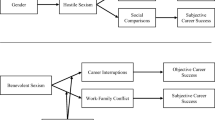Abstract
This paper examines the relationship between workaholism, sex, and sex role orientation among professionals. The sample consisted of 86 male and 106 female attorneys, physicians, and psychologists/therapists. Results indicated a significant relationship between sex and sex role stereotyping. Among females, workaholics were grouped exclusively in the sex role categories masculine and androgynous. Implications for counseling include increasing awareness of changing sex role attitudes among professional women and possible role conflict that can occur from integration of work and family.
Similar content being viewed by others
References
Allgeier, E. R. Beyond sowing and growing: The relationship of sex-typing to socialization, family plans, and future orientation. Journal of Applied Social Psychology, 1975, 5, 217–226.
Bailyn, L. Involvement and accommodation in technical careers: An inquiry into the reaction to work at mid-career. In Van Maanen (Ed.), Organizational Careers: Some new perspectives. London: Wiley, 1977.
Barnett, R. C., & Baruch, G. K. Women's involvement in multiple roles, role strain and psychological distress. Working paper #107. Wellesley College, Center for Research on Women, Wellesley, Mass., 1983.
Baruch, G. K., & Barnett, R. C. Role quality, multiple role involvement and psychological well-being in midlife women. Working paper #149. Wellesley College, Center for Research on Women, Wellesley, Mass., 1985.
Bem, S. L. The measurement of psychological androgyny. Journal of Consulting and Clinical Psychology, 1974, 42, 155–162.
Bernard, J. The future of marriage. New York: World, 1972.
Cantarow, E. Women workaholics. Mother Jones, 1979, 6, 56.
Deutsch, C. The workaholic spouse. The Parent's Magazine, 1979, 54, 36.
Epstein, C. G. Woman's place: Options and limits on professional careers. Berkeley: University of California Press, 1970.
Flaim, P. O., & Fullerton, H. N. Labor force projections of 1990: Three possible paths. Monthly Labor Review, 1978, 12, 25–35.
Frieze, I. H., Parsons, J. E., Johnson, P. B., Ruble, D. N., & Zellman, G. L. Women and sex roles: A social psychological perspective. New York: W. W. Norton and Co., 1978.
Gove, W. R., & Tudor, J. Adult sex roles and mental illness. American Journal of Sociology, 1973, 78, 812–835.
Machlowitz, M. Workaholism: What's wrong with being married to your work? Working Women, 1978, 3, 51–52, 75.
Machlowitz, M. Workaholics: Living with them, working with them. Reading, Mass.: Addison-Wesley, 1980.
Moiser, S. K. Workaholics: An analysis of their stress, success and priorities. Unpublished master's thesis, results reported in Marriage and Divorce Today, 1984, 4, 4.
Nieva, V. F., & Gutek, B. A. Women and work: A psychological perspective. New York: Prager, 1981.
Pifer, A. Women working toward a new society. The Urban and Social Change Review, 1978, 11, 3–11.
Rand, L. Masculinity or femininity? Differentiating career-oriented and homemaking-oriented college freshmen women. Journal of Counseling Psychology, 1968, 15(5), 444–450.
Stoper, E. Alternative work patterns and the double life. In E. Boneparth (Ed.), Women, power and policy. New York: Pergamon Press, 1982.
Vierra, A., & Yogev, S. Childlessness and workloads of university faculty women. Mansucript submitted for publication, 1982.
Yankelovich, D. Work, values and the new breed. In C. Keer & J. M. Rosow (Eds.), Work in America: The decade ahead. New York: Van Nostrand Reinhold, 1979.
Author information
Authors and Affiliations
Rights and permissions
About this article
Cite this article
Doerfler, M.C., Kammer, P.P. Workaholism, sex, and sex role stereotyping among female professionals. Sex Roles 14, 551–560 (1986). https://doi.org/10.1007/BF00287455
Issue Date:
DOI: https://doi.org/10.1007/BF00287455




